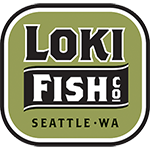January 07, 2014

Loki Fish Company announced today that laboratory analysis of five salmon species harvested by its fishermen in Puget Sound and Southeast Alaska during 2013 show no indications of elevated radiation levels.
In response to customer concerns over radiation releases into the Pacific Ocean from Fukushima, fisherman-owned Loki Fish Company contracted with internationally accredited Eurofins Analytical Laboratories of Metaire, Louisiana to conduct radiation testing on seven stocks of wild salmon.
Loki harvests and direct markets wild salmon through King County Farmers’ Markets and through national wholesale distribution. Tests were conducted on Pink, Keta, Coho, Sockeye and King salmon from southeast Alaska, and Pink and Keta salmon from Puget Sound.
Although the FDA contends that there is no evidence that radionuclides from Fukushima are present in Alaskan and Pacific Northwest seafood at a level that would be harmful to human health, it has not published results. Meanwhile unsubstantiated internet rumors regarding the safety of North Pacific seafood have become widespread.
"As fishing families who put salmon on the table of consumers, we are as concerned as anyone about the health of our marine ecology," said Pete Knutson, fisherman and co-owner of Loki. "We have long been active in environmental issues which affect salmon stocks and believe that environmental defense needs to be driven by science, not fear."
All seven stocks of salmon were tested for the radionuclides associated with the nuclear plant failures in Japan: Cesium 134, Cesium 137, and Iodine 131. Of the seven samples, five did not register detectable levels of radionuclides. Two of the samples registered at trace levels – Alaskan Keta at 1.4Bq/kg for Cesium 137, and Alaskan Pink at 1.2Bq/kg for Cesium 134. There were no detectable levels of iodine-131 in any samples.
To put those numbers in perspective, the critical limit set by the FDA for either Cesium-134 or Cesium-137 is 370 Bq/kg, far above the amount found in Loki’s Alaskan Keta and Pink salmon.
Copies of the Eurofin sampling results can be obtained from lokifish.com.
Note: Becquerel per kilogram -Bq/kg-is a standard scientific measure. It is “the number of particles decaying per second in each kilogram of a sample.” (UC Berkeley Dept of Nuclear Engineering). Radionuclides are present in many everyday foods – bananas commonly test at levels around 130Bq/kg for potassium-40.
Related sources:
http://www.fda.gov/newsevents/publichealthfocus/ucm247403.htm The FDA discusses food safety questions in relation to the Fukushima incident.
http://www.eurofins.com/en/about-us/eurofins-fact-sheet.aspx
The homepage of the internationally credentialed laboratory which tested Loki salmon from Puget Sound and Southeast Alaska.
http://www.nuc.berkeley.edu/UCBAirSampling/FoodCHain
Web page of the Department of Nuclear Engineering at UCBerkeley. This links to their post Fukushima measurements of radionuclides in Bay Area soil, foods and Pacific Northwest salmon.
http://www.vitalchoice.com/shop/pc/articlesView.asp?id=2083 link to radiation test results on North Pacific seafood and discussion from an Anacortes-based fish retailer, Vital Choice
Click here to download the press release!
Click here to download the testing reports!
